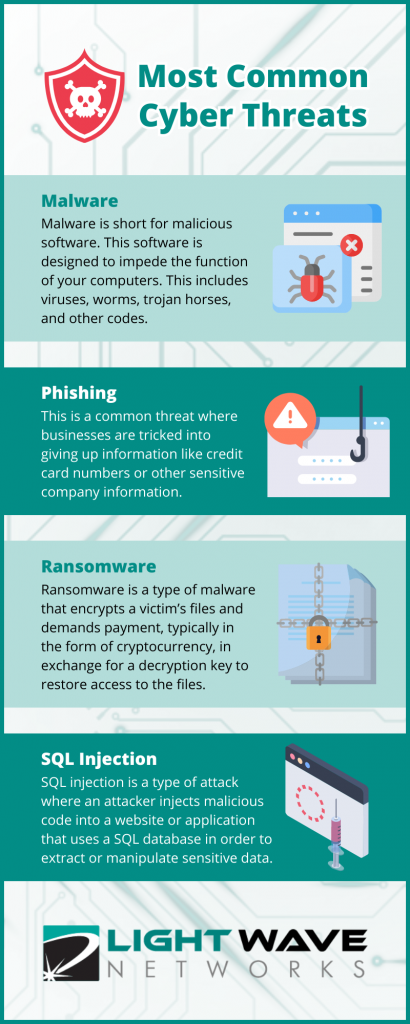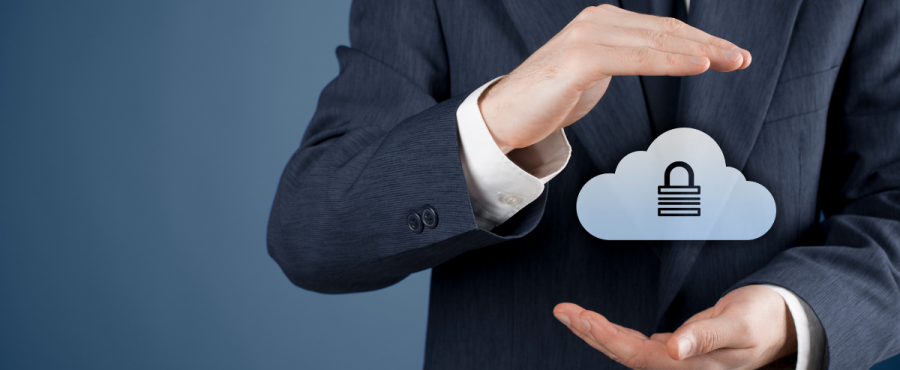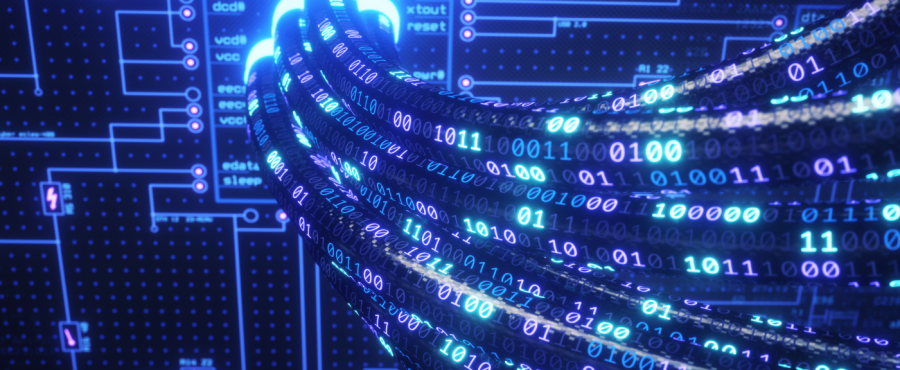What Are the Different Types of Cyber Threats?
There are many different types of cyber threats that your businesses should be aware of. There is nothing that highlights the need to be aware of cyber threats as a business more than the fact that most of a business’s operations and documents are stored on computers or on the internet. Business owners may also be shocked to discover that there are many different types of cyber threats and several different ways that you could protect your business from them. To learn more about the types of cyber threats that you should be aware of, continue reading below from our hyper-converged data center.
Most Popular Kinds of Cyber Threats
As mentioned above, there are many different kinds of cyber threats that businesses need to be aware of. Our Dallas and New Jersey cloud hosting professionals describe some of the most common ones for your awareness.
- Malware – Malware is short for malicious software. This software is designed to impede the function of your computers. This includes viruses, worms, trojan horses, and other codes.
- Phishing – This is a common threat where businesses are tricked into giving up information like credit card numbers or other sensitive company information.
- Ransomware – Ransomware is a type of malware that encrypts a victim’s files and demands payment, typically in the form of cryptocurrency, in exchange for a decryption key to restore access to the files.
- SQL Injection – SQL injection is a type of attack where an attacker injects malicious code into a website or application that uses a SQL database in order to extract or manipulate sensitive data.
How to Protect From Cyber Attacks
To protect against cyber attacks, businesses should implement a multi-layered approach that includes measures such as using strong passwords and two-factor authentication, keeping software up to date, training employees, using encryption, backing up data, limiting access, and monitoring network activity. It’s also important to regularly review and update security policies and procedures, conduct regular vulnerability assessments, and have a comprehensive incident response plan in place. Additionally, businesses should consider working with a cybersecurity expert or managed service provider to ensure they have the most up-to-date protection and can quickly respond to any threats that may arise. By taking these steps, businesses can better protect themselves against cyber attacks and minimize the risk of data breaches, financial losses, and reputational damage.
How Managed Network Services Help With Cyber Attack Protection
Cyber attack protection is best overseen by businesses that are dedicated to backup and disaster recovery like LightWave Networks. Businesses like ours are much more experienced with network security monitoring, which means that they are specialized in monitoring all of your systems while your business is doing what is best for it. A colocation and managed network provider like our business makes an effort to continuously scan your systems to detect any vulnerabilities in your network. Businesses like ours provide the best cybersecurity techniques to prevent hacking and other cybersecurity threats.
More About LightWave Networks
Aside from detailing the different types of cyber threats and what you could do to prevent them, LightWave Networks provides services around the United States like Dallas cloud hosting, New Jersey cloud computing, New Jersey dedicated servers, and Dallas VPS servers, among many others. Contact our business today to learn more about colocation hosting pricing and beyond.
About Cloud Data Security
It is not uncommon nowadays for businesses to rely on the cloud to store their data and important information. When it comes to the cloud, many businesses may be surprised to find out that these spaces are shared with other businesses and that these cloud computing environments could be infiltrated, which presents a ripe opportunity for security breaches and other hazards for businesses. If you are interested in learning more about cloud data security and all that it could offer you, continue reading below to hear expert advice from a dedicated colo server hosting business in LightWave Networks.
Read MoreAbout IT Infrastructure for Small Business
With more businesses than ever relying on the internet and online systems to store and monitor information related to No matter the size and scope of your business, you are going to need some degree of IT infrastructure and data storage solutions. There are many benefits to IT infrastructure, including the need for easy access to important documents, employee information, and customer information. In recent years, the introduction of cloud servers and computing has made small businesses much more technologically savvy and even dependent. If there is one thing that your business is missing, it is understanding the benefits of IT infrastructure for small businesses and the different options available to you. To learn more about this topic, continue reading below to hear from our server outsourcing business and professionals.
Read MoreHow to Prevent Data Loss
With more businesses than ever relying on the internet and online systems to store and monitor information related to their businesses and its processes, a large consideration for them is to make sure that their data is safe and free from a breach. Data security breaches are especially dangerous if you consider what kind of data businesses usually hold, which could be incredibly sensitive. This is particularly true for businesses that rely heavily on client data like lawyers or insurance companies. A security breach for these kinds of businesses could also breach contracts and involve legal issues. If you are wondering how to prevent data loss, our hyper-converged data center is here to answer your questions. Continue reading below to learn more from our experts.
Read MoreWhy Upgrade Your IT Infrastructure?
As your business expands, it is only natural that you look to upgrade certain features of it. This could be the number of employees on your payroll, changing operations, or even upgrading your IT infrastructure. Since a business’s IT services are an excellent way to manage documents and other important information that relates to your business. There are many benefits to upgrading an IT infrastructure, and our New Jersey web hosting and server outsourcing business is here to explain some of them. So, why upgrade your IT infrastructure? LightWave Networks explores more in the following article.
Read More





